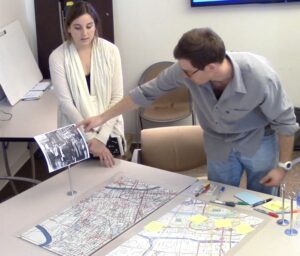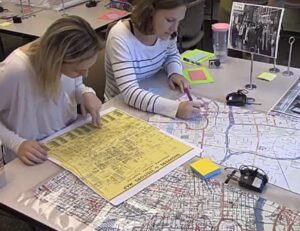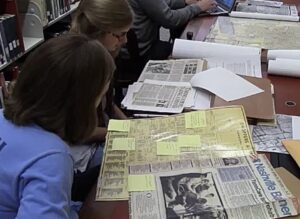Research and References

Bridging Learning in Urban Extended Spaces (BLUES)
NSF Cyberlearning Grant #1623690  Our research supports an argument for storytelling as a tool and practice, which provides a new way to engage people in learning about local history. Data analysis gathered during iterations using the framework indicates that the practice of storytelling as part of the curation and sharing of map-based story tours allowed participants to develop an understanding of history as a perspective on the past as opposed to a set of facts to be learned. We suggest the increased sense of agency which students demonstrated in their choice of story theme and selection of their own media helped them to view history as a version of events told from someone’s point of view.
Our research supports an argument for storytelling as a tool and practice, which provides a new way to engage people in learning about local history. Data analysis gathered during iterations using the framework indicates that the practice of storytelling as part of the curation and sharing of map-based story tours allowed participants to develop an understanding of history as a perspective on the past as opposed to a set of facts to be learned. We suggest the increased sense of agency which students demonstrated in their choice of story theme and selection of their own media helped them to view history as a version of events told from someone’s point of view.
The intellectual toolkit which students work with as part of the DSSL framework contains conceptual tools for making sense of their place in the world, which is especially relevant to students who have developed master or schematic narratives from interactions with only dominant accounts of the past. The contextual historical knowledge and understanding, and the conceptual tools students utilize during their storyline research, curation and sharing challenge their preexisting schematic narratives. Over time, the DSSL framework may enable them to develop a more sophisticated understanding of history and their place in the historical present (Wills, 2011; O’Neill, Guloy & Sensoy, 2014).
The pre- and post-task ‘Day in the Life’ story telling activities can be used by educators as an assessment of learning within the DSSL framework. From analyzing the pre- and post-task stories which groups have produced, we have found that students’ learning appears to develop in a number of ways:
•Recall of historical facts and dates increases
•Spatial awareness of city streets, neighborhoods and regions increases
•Post-task stories are longer and more developed than pre-task stories
•Post-task stories include multiple perspectives indicating that students appreciate that a historical narrative is a perspective on the past from a particular point of view
•Students report finding the post-task easier than the pre-task as they have better historical contextual understanding and have increased agency when authoring historical fiction.
•Participants ask more questions about the past, including those which challenge the version of history they are reading and the perspective that has been represented in the archival material.



Above: Examples of pre- and post-task stories from the ‘Day in the Life’ activity, authored by graduate students in 2015.
Papers and Presentations
Lubbock, H., Hostetler, A. L., Hall, R. & SLaM. (2022). Using digital spatial storylines to explore local history. Social Education, Fall 2022, 86(4), 278-284.
Hall, R., Shapiro, B., Hostetler, A. L., Lubbock, H., Owens, D., Daw, C., Fisher, D., & the Spatial Learning and Mobility (SLaM) Lab. (2020). Here and then: Learning by making places with digital spatial story lines. Journal of Cognition and Instruction – Learning on the Move Special Issue, 1-26. DOI: 10.1080/07370008.2020.1732391
Hostetler, A. L. (Accepted-Forthcoming). Digital spatial storylines: Storytelling with teacher candidates to explore local history as counternarrative. A paper presented at the Annual Conference of the American Educational Research Association (AERA), Denver, CO, April 2025.
Hostetler, A. L. (2024). Rhythms of resistance: Local history and counter-narrative in spatial stories. A presentation at the College and University Faculty Assembly of the National Council for the Social Studies annual conference, Boston, MA, November 2024.
Washington, L., & Hostetler, A. L. (2021). NMAAM Sips & Stanzas: Jefferson street sound. Invited panel discussion on north Nashville music history with the National Museum of African American Music, December 2021.
Lubbock, H. E., Hostetler, A. L., Washington, L., & SLaM. (2020). Finding history in place: Making meaning with public history. A paper presented at the annual meeting of the College and University Faculty Assembly (CUFA) of the National Council for the Social Studies (NCSS), Virtual Conference, December 2020.
Lubbock, H. E., Hostetler, A. L., Washington, L., & SLaM. (2019). Jefferson Street sound: Grassroots public history as informed action. A paper presented at the annual meeting of the College and University Faculty Assembly (CUFA) of the National Council for the Social Studies (NCSS), Austin, TX, November 2019.
Lubbock, H. E., Hostetler, A. L., & SLaM. (2019). “History’s a myth”: Storytelling with youth to explore local history. A paper presented at the Annual Conference of the American Educational Research Association (AERA), Toronto, Canada, April 2019.
Hostetler, A. L., Shapiro, B. R., Lubock, H., Hall, R., Owens, D., Fisher, D., Daw, C., Surovek, C. R., & Spatial Learning and Mobility (SLaM) Lab. (2018). Back in the day: Digital spatial storylines as conceptual practices for learning and preserving local histories. A paper presented at the annual meeting of the College and University Faculty Assembly (CUFA) of the National Council for the Social Studies (NCSS), Chicago, IL, November 2018.